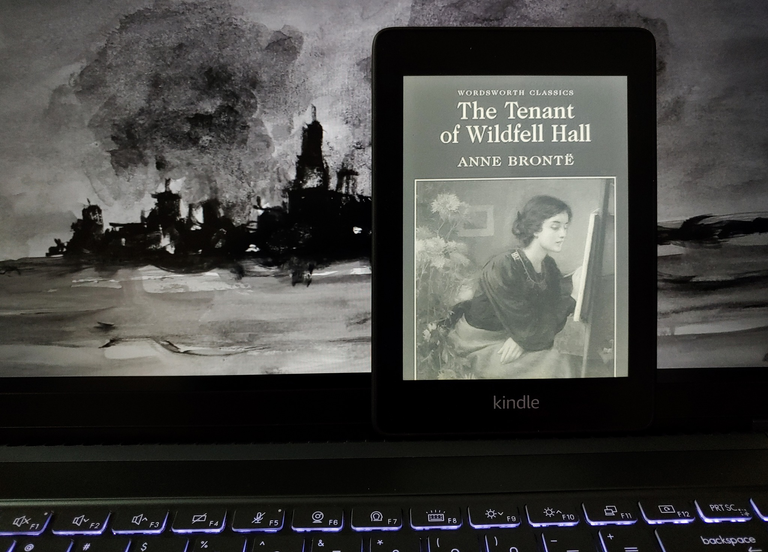The Tenant of Wildfell Hall
Anne Bronte

Seeing me reading The Tenant of Wildfell Hall, someone asked what it was about. A thought immediately ran through my head, and formed the following idea—this is the first novel that has a clear and concise framework of what feminism is. Later when I went online to fact-check, it was indeed confirmed this was one of the early feminist novels. Albeit, elements of classism, traditional Christian virtues and alcoholism were frequent visitors. Romance, however, is the driving force of the novel.
The book helps to elucidate a few historical social reforms that took place after the time it was written in, such as, women could not initiate any divorce, however unjust and cruel treatment they may receive in their matrimony. “You can leave your brother and mother, if they’re unkind to you, but you are bound to your husband for life”, the protagonist Helen reminds another woman. The law that enabled women to initiate divorce was passed a decade after the book came out, even then, the woman had to provide proof of adultery against the man.
Anne Bronte was a clear headed thinker and the ideas she proposed may seem very logical and expected in today’s society yet they were likely to be seen as abhorrent back then, which is quite apparent from the book’s initial reception.
Treatment of a female child anent her upbringing is still an issue in our part of the world, UNICEF’s Meena cartoon is a trademark of the 90s. It is no wonder the 19th century was extremely prejudiced against female children. As I see it, the brutish chauvinistic behavior and uncouth rough barbarism male children develop later on in life, commonly referred to as ‘being tough’ are directly linked to their upbringing, as they lack elements of empathy, moderation and moral education. Anne Bronte begins the book by challenging this practice, as the protagonist decides to raise her young boy in a humane way, incorporating both feminine and masculine nurturing techniques.
Her ideas regarding marriage relationships and choice of partner were so modern and liberal that the realization that these could occur to someone in the 1840s, while most people in the 2020s still adhere to societal arrangement of lawful sex which I will refer to as barbarism, was shocking enough! “Thoughtlessness may lead to every crime”, indeed, and people wonder why they have unhappy marriages! Choose your partner wisely, “Principle is the first thing, after all; and next to that, good sense, respectability, and moderate wealth.” as she puts it. While it is said for the woman when she is looking for a suitable man, I would like to apply it to the male case as well. Suddenly, a woman is no longer about her beauty, bodily attractiveness, fertility or complexion. If you cannot find such a partner, that is quite alright, as she brilliantly put “though in single life your joys may not be very many, your sorrows, at least will not be more than you can bear.” The foolish modern attempt of ‘ওকে ভালোবাসা দিয়ে ভালো করে তুলবো’-- is severely criticized ( one of the theme of the novel) and aptly so as the naivety in such an attempt reeks to high heaven.
I should note that beyond the ideas rendered in the book, it has a poignant tale of love, betrayal, romantic pursuit and heartbreaks. In some parts of the book, I was roused by mountains of rage, and in some others, it grabbed my heart and squeezed it as I writhed in anticipation of an unjust action. I secretly harbored the hope for the death of a fallen tyrant, I cheered for the faltered, imperfect hero, to give him a chance at redemption. The book can be dubbed partly a thriller and mystery, in a sense. But above all, this is a journey of a woman and her unyielding personal self, to uphold everything she believes in. A great deal of self-evaluation came into play.
I have some criticisms. I got sore at Anne Bronte for conforming to some of the expectations of then society to make the book acceptable in the first place, even though I’m fully aware without those undertakings, this book would probably not see the light of day.
I couldn’t care less for the Christian doctrines that were frequent throughout, although they are some general moral guidance quite evident to reason and sanity, I detest the idea of them being delivered by an omnipotent deity.
This has been a marvelous read, and I can see it becoming a book I will adore for the long run and refer to whenever the chance arises. It is shame Anne Bronte died at the age of 29, for I can only anticipate the benefits humanity would reap if she persevered.
Photo belongs to me


